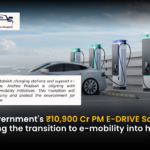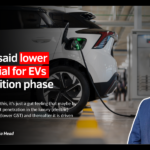
A Sustainable Shift: Saudi Arabia’s Electric Future
Saudi Arabia, long known for its vast oil reserves, is now accelerating its shift towards a more sustainable and diversified future. As part of the ambitious Vision 2030, the Kingdom is embracing electric mobility as a cornerstone of its strategy to improve the standard of living, reduce carbon emissions, and lessen its reliance on oil. This move is reshaping the country’s transportation landscape, with electric vehicles (EVs), smart urban mobility solutions, and advancements in green technology becoming a priority.
The adoption of electric cars is gaining momentum in Saudi Arabia, driven by a combination of technological advancements, government incentives, and a growing environmental awareness. Not only are local car manufacturers and international giants such as Lucid Motors setting up operations in the Kingdom, but extensive infrastructure development, including the installation of EV charging stations, is also taking place to support the shift. As a result, a significant portion of the Saudi population is considering making the switch to electric vehicles. Here’s a detailed look at the exciting developments in Saudi Arabia’s electric mobility sector and what it means for the future.
Vision 2030: Saudi Arabia’s Push for Sustainable Transportation
Saudi Arabia’s Vision 2030 is a transformative plan designed to reduce the country’s dependency on oil and diversify its economy. A major element of this vision is the development of sustainable transportation solutions, particularly electric mobility. The Kingdom’s commitment to a greener future is seen in its investments in electric vehicles (EVs), driverless metro systems, electric scooters, and other cutting-edge urban mobility solutions.
The government is prioritizing the creation of an EV ecosystem, which includes incentives for EV buyers, tax exemptions, subsidies, and the establishment of an expansive charging infrastructure. These efforts are not only focused on reducing carbon emissions but also on improving air quality and making the cities more livable. With the rise of EV adoption, Saudi Arabia is positioning itself as a leader in clean, innovative transportation in the Middle East.
Additionally, with the influx of both local and international EV manufacturers, including Lucid Motors, the Kingdom is setting a global benchmark for electric vehicle manufacturing, infrastructure, and sustainability. All of this is in line with the government’s goal of diversifying its economy and making electric mobility an integral part of everyday life in the Kingdom.
Lucid Motors: A Milestone in Saudi Arabia’s EV Journey
In a landmark development for the Kingdom’s electric vehicle (EV) ambitions, Lucid Motors, in collaboration with the Saudi Public Investment Fund (PIF), has established a state-of-the-art manufacturing plant in Saudi Arabia. This collaboration signals a pivotal moment in Saudi Arabia’s commitment to the global EV market and represents a strategic effort to nurture homegrown EV production.
The manufacturing plant will produce advanced electric vehicles specifically tailored to meet the needs of Saudi consumers and the broader Middle Eastern market. Lucid Motors, known for its high-performance luxury electric cars, will introduce cutting-edge technologies that align with the Kingdom’s goals for a sustainable future. The facility not only aims to serve the local market but also the wider global market, creating a ripple effect in both technology development and employment opportunities within Saudi Arabia.
Furthermore, this partnership emphasizes Saudi Arabia’s strategic role in the future of electric mobility and its ambition to become a major player in the global EV industry. With Lucid Motors setting up shop, the country is solidifying its place as a key player in the transition to clean energy transportation.
Electric Mobility Incentives: Encouraging the Shift to EVs
Saudi Arabia is making significant strides in incentivizing the adoption of electric vehicles (EVs) across the country. As part of its larger strategy to reduce its reliance on oil and embrace sustainable energy solutions, the government is offering a variety of incentives to encourage citizens to make the switch to electric cars. These incentives include:
- Tax Exemptions: EV buyers benefit from tax exemptions, lowering the initial cost of purchasing electric vehicles.
- Subsidies: The government provides subsidies for electric vehicles to make them more affordable for a wider range of consumers.
- EV Charging Infrastructure: Thousands of EV charging stations are being set up across major cities, making it easier for drivers to charge their vehicles.
- Reduced Maintenance Costs: EVs typically require less maintenance than traditional vehicles, which can help owners save money in the long term.
- Eco-Friendly Benefits: The reduction in carbon emissions and the promotion of green energy solutions are key aspects of the Kingdom’s Vision 2030.
According to a 2024 AlixPartners International Electric Vehicle Consumer-Sentiment Survey, 70% of Saudi residents are either “very” or “moderately” likely to purchase an electric vehicle in the near future. This figure is expected to rise to 85% by 2035, highlighting the growing interest and potential for EV adoption in the Kingdom.
The Future of EVs in Saudi Arabia: What’s Next?
The future of electric vehicles in Saudi Arabia looks promising, with several key factors contributing to the country’s growing EV adoption rate. Here’s a snapshot of what to expect in the coming years:
- Widespread Charging Infrastructure: The government’s ongoing efforts to install thousands of EV charging stations will ensure that EVs are practical for everyday use, addressing range anxiety among potential buyers.
- Continued Growth in EV Sales: As the incentives and infrastructure improve, the sales of electric vehicles are expected to soar, with projections showing that up to 85% of Saudis may own electric vehicles by 2035.
- Global Manufacturers Setting Up Shop: More global EV manufacturers, like Lucid Motors, are setting up plants and operations in Saudi Arabia, further boosting local production and technological innovation.
- Focus on Sustainability: Saudi Arabia’s Vision 2030 emphasizes sustainability, and EVs play a major role in this vision, contributing to cleaner air, reduced emissions, and improved quality of life.
- Public Transit Transformation: Saudi Arabia is also investing in electric public transport solutions, including driverless metro trains, to make urban mobility more sustainable.
With all these advancements, Saudi Arabia is positioning itself as a leader in the electric mobility revolution, setting the stage for a greener, more diversified future for its economy and its people.









